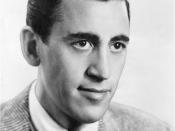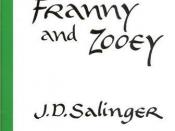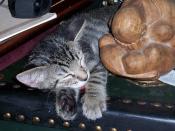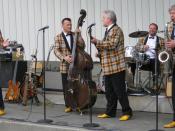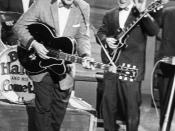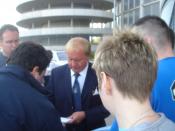J.D. Salinger undertones a typical American family's clash with religion in the novella Franny and Zooey. In this novella, he uses a great deal of dialogue and explores family interaction to stress religous confusion. In the "Franny"ÃÂ section, all the action takes place in the restaurant with Lane and Franny. This section is used primarily as foreshadowing and exposition to the "Zooey"ÃÂ section and the problems they encounter during it. In "Zooey"ÃÂ, almost all the interaction takes place in the bathroom between Zooey and his mom or in the living room with Zooey and Franny. Franny is deeply depressed and confused about her life and religion's role in her life. Mrs. Glass is extremely confused with her children's problems because, unlike her children, she has never experienced strife with religion. Her children were all negatively affected by religion, especially her youngest two. This suffering is shown through the dialogue of Mrs.
Glass and her children. Salinger uses the Glass family's interaction and dialogue to portray an American family's religious crises.
Through his works, Salinger's reflects his own eccentricity.
Leslie M. Pendelton said in Masterplots "Salinger's works have been compared to that of William Faulkner, Ernest Hemmingway, and F. Scott Fitzgerald"ÃÂ (2425). In Masterplots Pendelton says, "The character of Buddy has been identified as the alter-ego of Salinger, who is known to be a heavily autobiographical writer, and who has been accused of being self-indulgent and preachy, especially in the later works introduced by Franny and Zooey"ÃÂ (2425)."Salinger shows marvelous sensitivity to the young, to the language, and to the fraudulence of contemporary America"ÃÂ ,said Stanly Young in Contemporary Literary Criticism. (463) Pendelton thinks that Salinger is regarded, whether critically or reverentially, as the literary force from the beat era to capture the spirit and speak to the youth of America (2425). This is why many readers are undecided about the book.
Donald Newlove says in Contemporary Literary Criticisms, "I have very mixed feelings about Franny and Zooey"ÃÂ (463).
This novella established a new kind of writing for Salinger. Katherine Edwards stated in Contemporary Literary Criticism, "With this novel, Salinger took a marked turn from focusing on action, structure, and humor to a preoccupation with monologue, character development, and seriousness"ÃÂ (465).
"Salinger tries to gradually reveal the complex nature of otherwise static characters. Franny and Zooey is primarily concerned with the various trials of adolescence: alienation, loss of innocence, the obscenity of modern life, the search for meaning, and the redeeming power of love"ÃÂ ,claims Paul Gibson (Contemporary Literary Criticism 464).It is in "Zooey"ÃÂ that the discourse and detail take the place of plot and structure.
The religious undertone is shown by the Glass family's interaction and dialogue. Zooey constantly refers to himself and Franny as "freaks"ÃÂ. He says that religion has been drilled into them since they were little and that this has caused them a great deal of pain and confusion. Zooey says that because of this himself and Franny are not able to interact with people.In this passage Salinger shows Zooey's great struggle with religion.
Zooey says, "My God. I can't even sit down to lunch with a man any more and hold up my end of a decent conversation. I either get so bored or so goddamn preachy that if the son of a bitch had any sense, he'd break his chair over my head...Not that anybody's interested, but I can't even sit down to a goddamn meal, to this day, without first saying the Four Great Vows under my breath, and I'll lay any odds you want Franny can't, either. They drilled us with such goddamn...My God, I've been mumbling that under my breath three meals a day every day of my life since I was ten. I can't eat unless I say it"ÃÂ (104). Zooey screams at Mrs. Glass about how Buddy and Seymoure did to himself and Franny when they were young, "We're freaks, the two of us, Franny and I...I'm a twenty-five-year-old freak and she's a twenty-year old freak, and both those bastards are responsible"ÃÂ (103). Salinger uses dialogue to demonstrate many feelings and emotions. Pendelton says in Masterplots that the strong Judeo-Christian element in Franny and Zooey is different from Salinger's previous Zen-Buddhist point of view. (2425) Salinger takes a more general view of religion; not as a solution to world issues, but in learning and living with one's self (2425). The Glass family is affected by religion, like many families. By making the Glass family Judeo-Christian, Salinger implies that the Glasses are representative of every family suffering from religious pressures. The Glasses have studied and dealt with many religions since they were young. Therefore, the Glass family feels the pressure of all religions. Mrs. Bessie Glass is oblivious to her children's struggles with religion. Bessie is a strong Irish-Catholic woman who deals with what she knows. Mrs. Glass does not understand Zen-Buddhism and all the other religions her children are overcome with. When Zooey explains Franny and his problems she is perplexed. Bessie is sitting in the bathroom while Zooey is talking about the Four Great Vows and how he must recite them when Bessie cautiously interrupts, "The four great what"ÃÂ (104). In Franny and Zooey Bessie does not understand why all of her intelligent children are no help to each other. She wants to understand them but simply cannot (84). No one can understand the struggle of those affected by religion except those who are effected.
In Franny and Zooey J.D. Salinger uses extensive dialogue to prove Franny and Zooey's religious struggles. He showed the harm and pain it can cause families. Many families are affected by religion, some in good ways and some in bad. The people who feel that they are affected by religion in a positive way, such as Mrs. Glass, do not try to understand religion, but have faith in it. Many people are affected in a negative way such as Franny and Zooey. Franny and Zooey look to religion for the wrong reasons; they look for answers and solid facts which do not exist. Bessie Glass is very naive towards religion, while Franny and Zooey are too sophisticated, and they search for answers.
Their searching caused them great heartache and confusion.
Salinger shows one way reilgion can affect people's lives.
Works Cited Bryfonski, Dedria, and Phyllis Carmel Mendelson, ed. Contemporary Literary Criticism. vol. 8. Detroit: 1978.
Katherine Edwards, Contemporary Literary Criticism. vol. 8.
Detroit: 1978. 465 Paul Gibson, Contemporary Literary Criticism. vol. 8.
Detroit: 1978. 464 Donald Newlove, The Village Voice, August 22, 1974. 463 Phillip Roth, Reading Mystic and Others, 1975. 465 Stanly Young, Contemporary Literary Criticism. vol. 8.
Michigan, 1978.
Magill, Frank N., ed. Masterplots. vol. 4. Pasadena, 1996.
Leslie M. Pendelton, Masterplots. vol. 4. Pasadena, 1996.
2425 Salinger, J.D. Franny and Zooey. New York: Bantam, 1962.
What if God was one of us: Salinger's portayal of America's struggle with religion.
